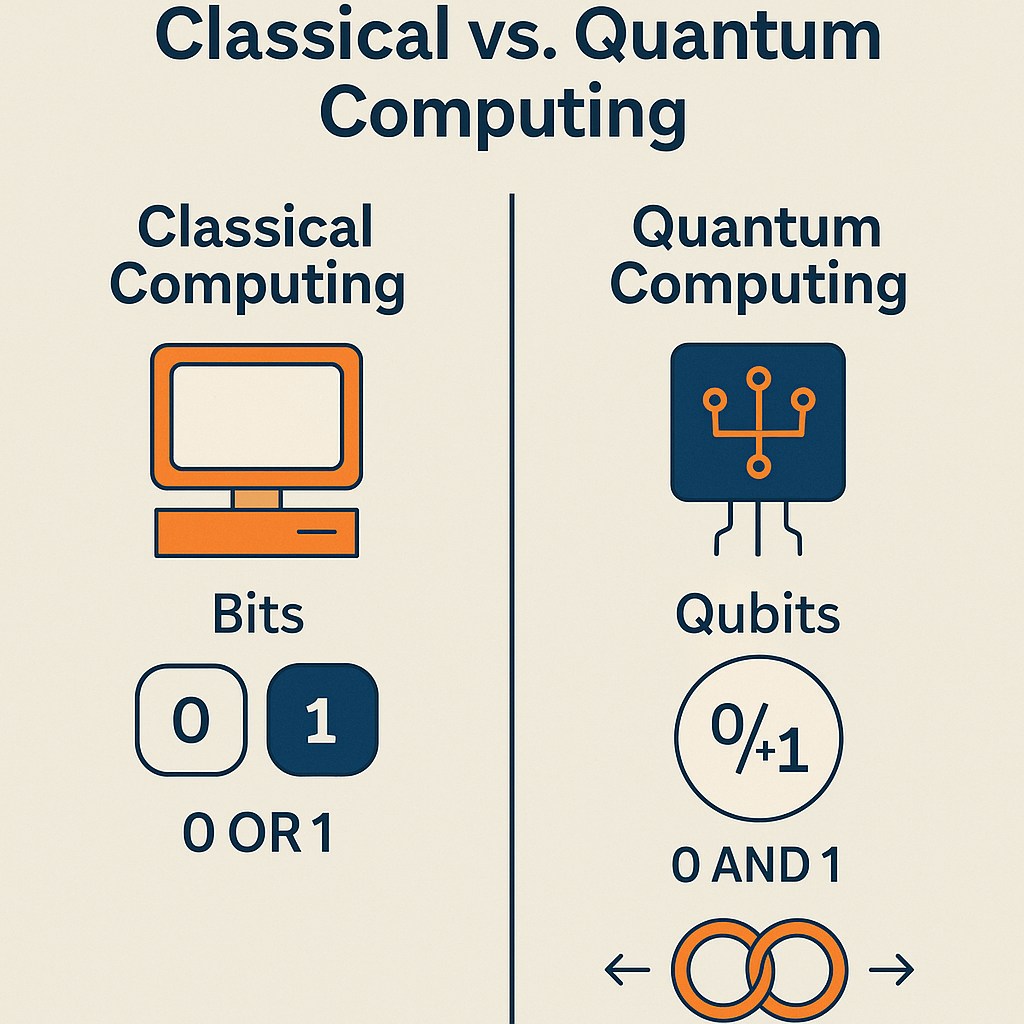Discover what quantum computing is, how it differs from classical computing, and why it’s set to transform industries like cryptography, AI, and drug discovery.
🧠 What Is Quantum Computing? Explained Simply
Quantum computing sounds like science fiction — computers that harness the laws of quantum physics to solve problems even supercomputers can’t touch.
But it’s very real, and in recent years, progress has accelerated rapidly. From Google and IBM to startups and national labs, quantum computing is now one of the most exciting frontiers in technology.
In this article, we’ll break it down in plain English — no physics degree required.

🧮 Classical vs. Quantum: What’s the Difference?
Let’s start with how traditional computers work:
- They process data using bits, which can be either
0or1. - Everything — from emails to video games — is built on combinations of these bits.
Quantum computers, on the other hand, use quantum bits, or qubits.
And qubits behave very differently, thanks to the weird (but real) rules of quantum mechanics.
⚛️ What Makes Qubits Special?
There are two main concepts to understand:
1. Superposition
- A classical bit is either
0or1. - A qubit can be both at the same time, like a coin spinning in the air.
- This lets quantum computers process many possibilities in parallel.
2. Entanglement
- Two qubits can become entangled, meaning their states are linked.
- Changing one instantly affects the other — even at a distance.
- This allows for incredibly fast and complex calculations.
💡 Why Is Quantum Computing Powerful?
Imagine trying to solve a maze. A classical computer tries one path at a time. A quantum computer tries every path at once — and finds the best route much faster.
That’s why quantum computing is so promising for:
- 🔐 Breaking (and rebuilding) encryption
- 🧬 Simulating molecules and atoms for drug discovery
- 📊 Optimizing complex systems like logistics, finance, and energy grids
- 🤖 Enhancing AI models through faster training
🧪 Real-World Applications (Early Stage)
| Industry | Use Case |
|---|---|
| Pharma | Simulate molecules to speed up drug development |
| Finance | Portfolio optimization and risk modeling |
| Cybersecurity | Quantum-safe encryption algorithms |
| Logistics | Route optimization across fleets |
| Climate | Modeling chemical reactions in carbon capture |
🛠️ Who’s Working on It?
Some of the biggest names in tech and science are racing to build scalable quantum computers:
- IBM: Building superconducting qubit systems
- Google: Claimed quantum supremacy in 2019
- IonQ: Trapped ion quantum computing (available on AWS & Azure)
- Rigetti: Building hybrid quantum-classical systems
- D-Wave: Specializes in quantum annealing (optimization problems)
⚠️ Limitations and Challenges
Quantum computing is still in the early days — kind of like classical computing in the 1950s. Challenges include:
- Qubit Stability: Qubits are fragile and lose data quickly (this is called decoherence).
- Error Rates: Calculations can be noisy, requiring error correction.
- Scalability: Building a large number of reliable qubits is still hard.
- Cost and Complexity: Requires extreme environments (like temperatures near absolute zero).
🧭 When Will Quantum Be Mainstream?
Experts believe we’re 5–10 years away from “quantum advantage” in commercial tasks — when quantum computers outperform classical ones in useful real-world problems.
But today, anyone can experiment with quantum via cloud platforms like:
📌 Final Thoughts
Quantum computing isn’t here to replace your laptop — it’s here to solve problems classical computers can’t.
As it matures, it could unlock breakthroughs in medicine, climate modeling, cryptography, and even artificial intelligence.
It’s complex, yes — but with just a few key ideas, anyone can start to understand and explore this incredible new world.